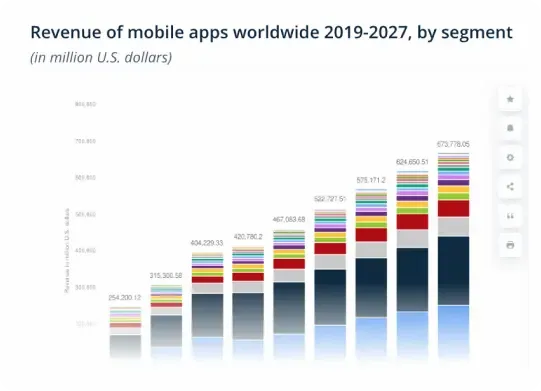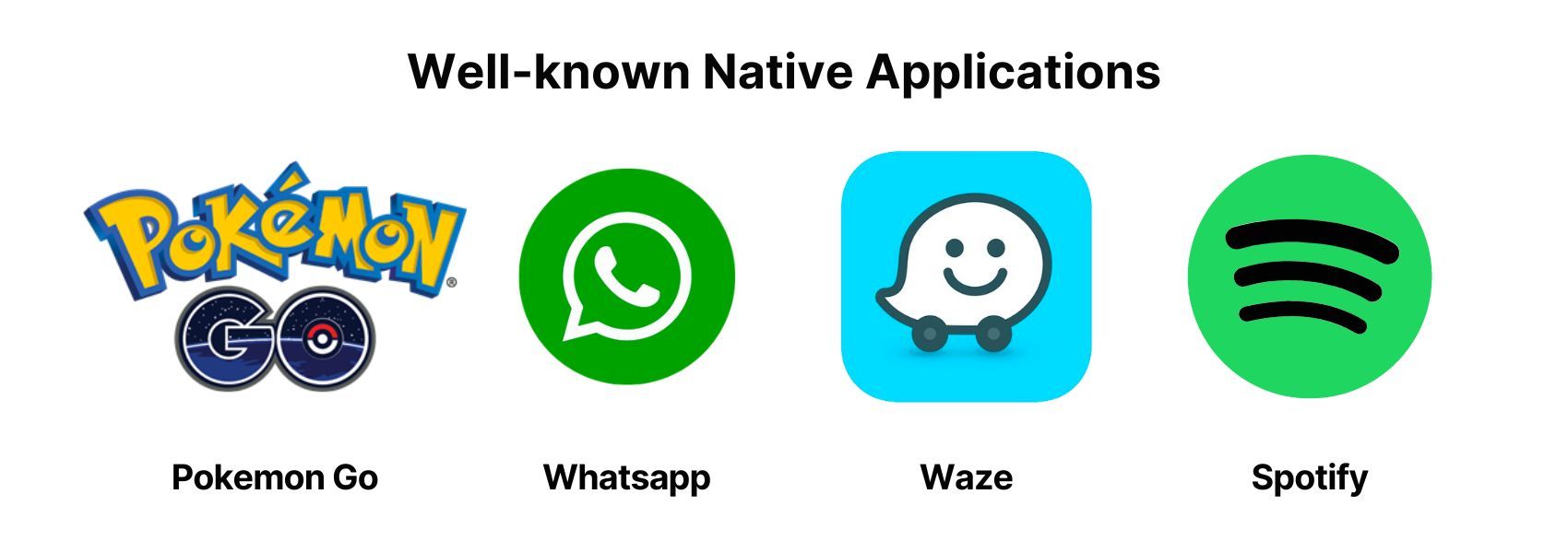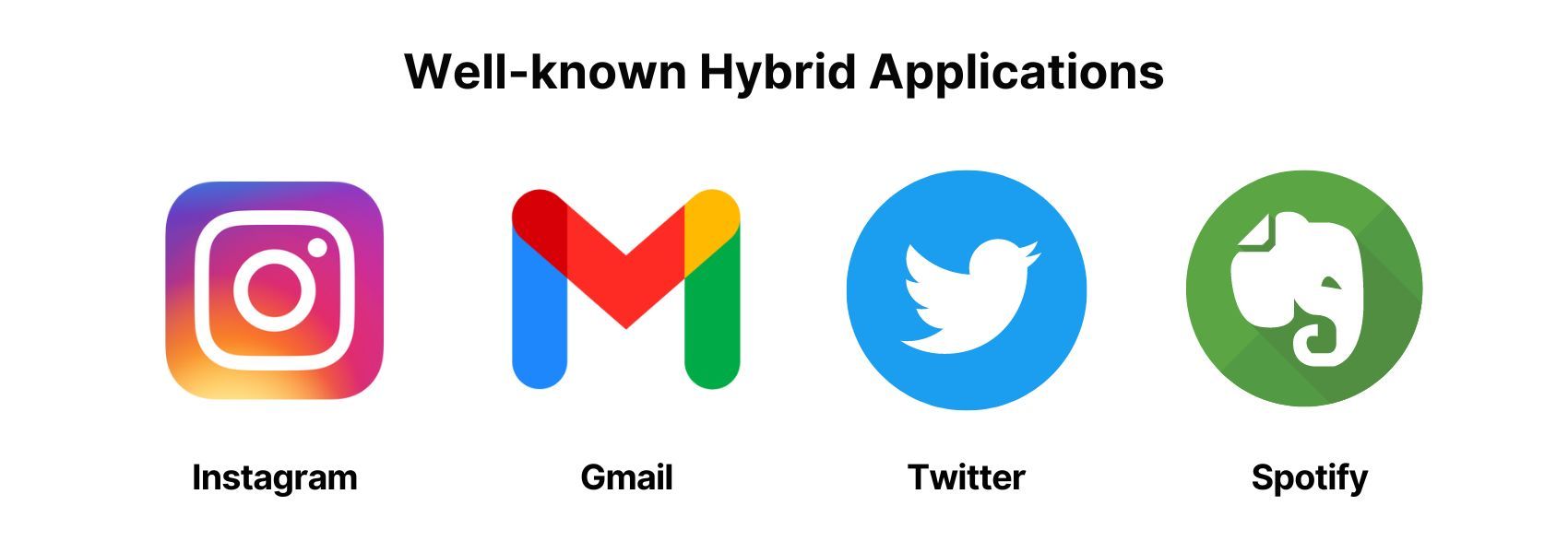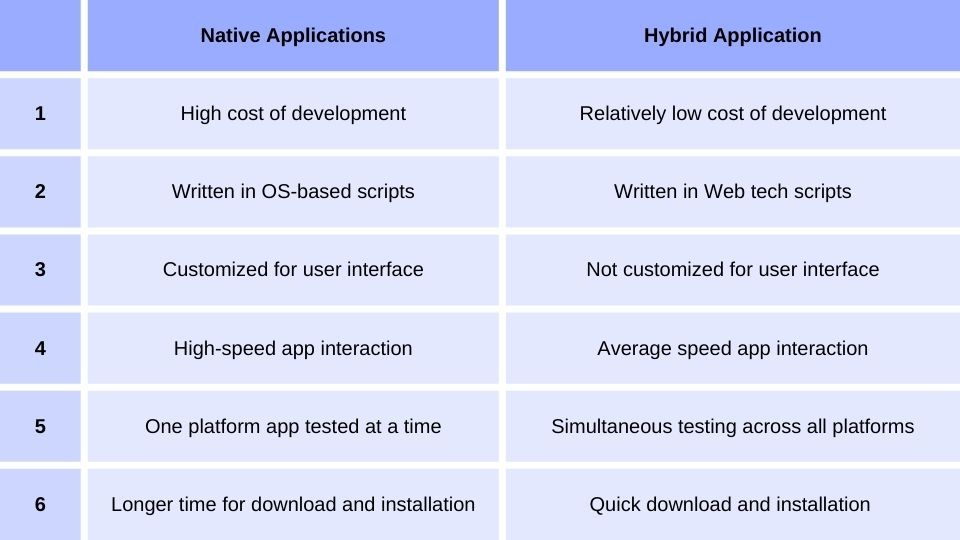In the 21st century, where everything and everyone is glued to their mobile devices, there is no more effective way to maximize reach than launching a mobile application.
As the global app revenue is expected to increase every year, deciding between developing a native or hybrid app can significantly impact your app's success. But which approach is best for your project?

In this article, we'll delve into the fundamental differences between native and hybrid apps, exploring their unique features, benefits, and drawbacks. By the end, you’ll have a clearer understanding of which development approach is best suited for your project and how it can drive your mobile strategy forward.
Definition
The first step is defining each one individually to draw out where the paths of mobile app development deviate:
What are Native Apps
One platform, one language, one application! For numerous operating systems, native apps need to be developed individually in the language best suited for that OS. In other words, each native application is written in one language to fit a single operating system, maybe iOS, Android, Symbian, or others.

These apps are quicker and more reliable in terms of speed and interaction with other mobile features like GPS, camera, microphone, etc. On the other hand, using a native app development process to launch a mobile app on multiple channels means a high cost.
When a Native App is Preferable:
- Performance-Centric Applications: High-performance apps such as graphics-intensive games like Pokemon Go or Fortnite.
- Access to Hardware Features: Apps requiring extensive use of device features like Snapchat or Waze.
- Optimized User Experience: Apps focusing on seamless user interactions like Instagram or Facebook.
- Security-Sensitive Applications: Banking or healthcare apps prioritizing enhanced security measures.
What are Hybrid Apps
Multiple platforms, one language, one application! So to say, hybrid applications are written in one language to fit various platforms. It is possible using web languages like JavaScript. It helps the application open on either web or mobile, irrespective of the operating system.

Hybrid apps are easier to develop and give a larger output at the cost of one app development. Though, the speed of hybrid apps, unlike native apps, depends on the browser, which might cause slow user interaction.
When a Hybrid App is Preferable:
- Cross-Platform Compatibility: Projects aiming for simultaneous deployment on multiple platforms.
- Rapid Development and Iteration: Prototypes, MVPs, or time-sensitive projects.
- Web-Content Integration: Apps needing seamless integration with web services.
- Budget-Conscious Projects: Startups or smaller businesses with budget constraints.
- Frequent Updates and Maintenance: Applications requiring regular updates like Trello or Evernote.
What is the difference between native apps and hybrid apps?
Apart from cross-platform and native platform uses, there are considerable differences between hybrid and native apps in development, speed, performance, and user experience.
There is more to native application vs. hybrid application than the language they are coded in. The determining factor when choosing between the two comes from user requirements. The development cost and update cost is one such player influencing the development.
Another noteworthy feature is the accessibility and uniformity of the app throughout, which affects the user's decision-making.

Development
The developer needs to code once for hybrid apps and run that application whenever and wherever needed. They not only work for mobile applications but can also be called into a web browser as the hybrid mobile app framework uses web technology. The multi-channel use requires extensive testing as the application may vary based on software versions and need native plugins at times.
As discussed above, native apps are developed separately for each platform and run separately. They need to be updated individually for each software version, with no connection between the two platforms. The testing, however, is easier for each OS app without having to consider the impact on other OS the application runs on.
Speed
Mobile applications saw a significant boom as all businesses and services tried to take advantage of rising mobile application users. The uniformity of using the same applications on mobile and web platforms came later, so hybrid application development grew in need. Though the change is in high demand, it is not necessarily an effective solution.
Speed comes into factor here. Speed rate is always higher for native apps vs. hybrid apps, where although efficient, the speed falls short of its native counterparts. It is because native apps are developed for a dedicated platform while hybrid applications development caters to all platforms, sometimes lacking specific features suited for one platform.
Performance
Performance for applications built using native and hybrid app development is similar in many cases. Even the hardware-based performance is matching. The exceptions are mobile applications with high caliber graphics, which may not show consistent performance in hybrid development.
Then there is speed, which adds to the performance metrics, giving native a slighter edge. But it also loses an edge for its reliance on open source software and libraries, which, despite making them simpler to work with, increase the attack risk, which is bound to affect application performance in the long run with high impact.
User Experience
Hybrid applications display a consistency of performance irrespective of browser or device OS. While this might sound perfect, it does not account for user interaction changes that change with the environment, turning the tide on user experience at times.
On the upside, it does provide online, and offline application access, which is ideal for application uses outside of internet access. Native applications also have offline access with many of the features, but they are developed for one platform specifically at a time.
It allows native app developers to add more fine points into the application for a heightened user experience and increased file size and update time. Native applications also have offline access with many of the features, but they are developed for one platform specifically at a time.
Thus, native applications take more extended download and installation time than their hybrid counterparts which does not sit well with the quick-consuming market expectations of the user.
Conclusion
All the applications, websites, businesses, and services serve one purpose at their core- the user. The user experience is the utmost deciding factor in choosing which native vs. hybrid app development path is optimal for the application.
The user might be a fast-paced group, luxury lifestyle-oriented individuals, or a business or one-for-all demanding demographic. The application needs to check those boxes to add value to the user’s experience.
Make a checklist of what the mobile app needs to accomplish for the user and check it against the above metrics. The pros and cons of each will decide your path between a hybrid app vs. a native app.
FAQ
Ques1 : What are the advantages of native apps over hybrid apps?
Ans 1 :
- Native apps are more responsive at runtime
- Better look and feel.
- Native apps are fast.
- Better user experience.
- Better performance.
- They are best for 3D content.
- Native app Ui allows users to relatively quickly understand navigation within the app.
Ques 2: What are the advantages of hybrid apps over native apps?
Ans :
- Code reusability: the code is written once and deployed across all mobile platforms.
- Lower cost.
- Best for simple applications.
- Easy maintenance.
- They can operate on both iOS and Android.
Ques 3 : Is Facebook a native or hybrid application?
Ans 3: Facebook is a hybrid app. It is a JavaScript-based framework, developed and maintained by Facebook, and is written in React-Native.
Ques 4: Should I develop apps in native or hybrid?
Ans 4: Make a checklist of what the mobile app needs to accomplish for the user and check it against the above metrics. The pros and cons of each will decide your path between a hybrid app and a native app.
Ques 5: Is Uber a native or hybrid app?
Ans 5: Uber is a hybrid app. It is written in languages like HTML5, CSS, and JavaScript and wrapped in a native container.


